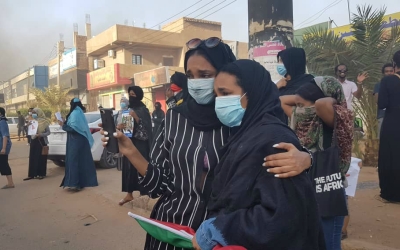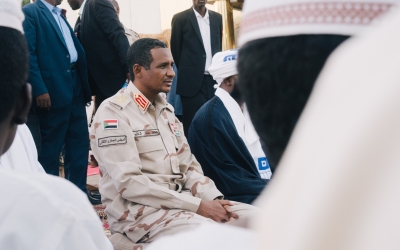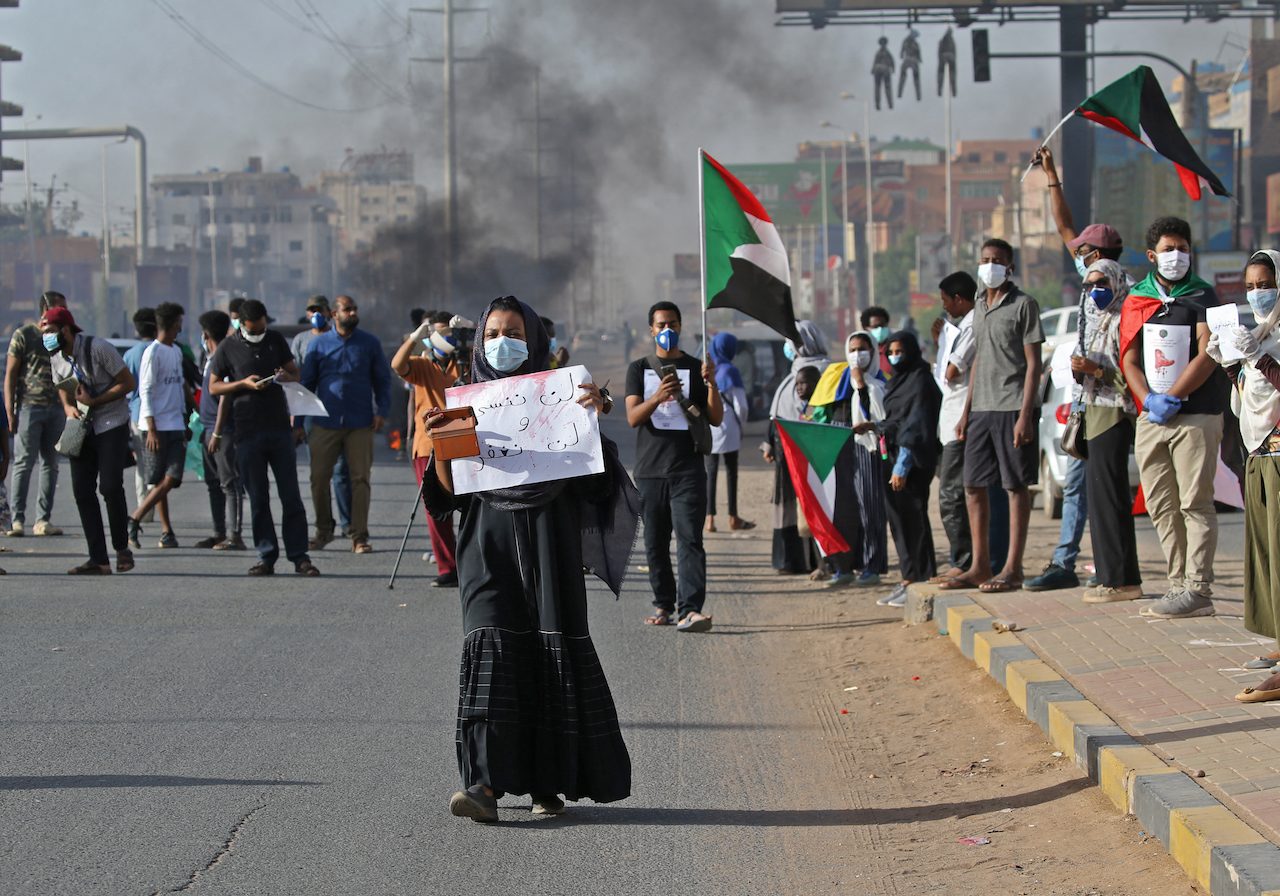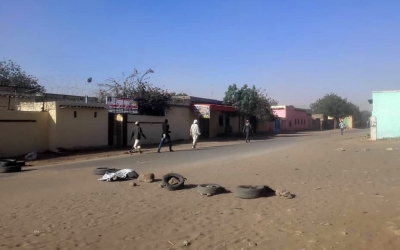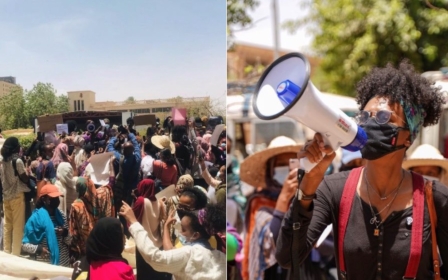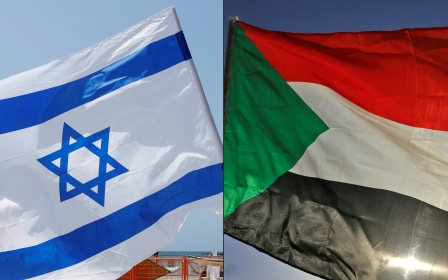Sudan: Discovery of unidentified bodies in morgue raises questions over secret killings
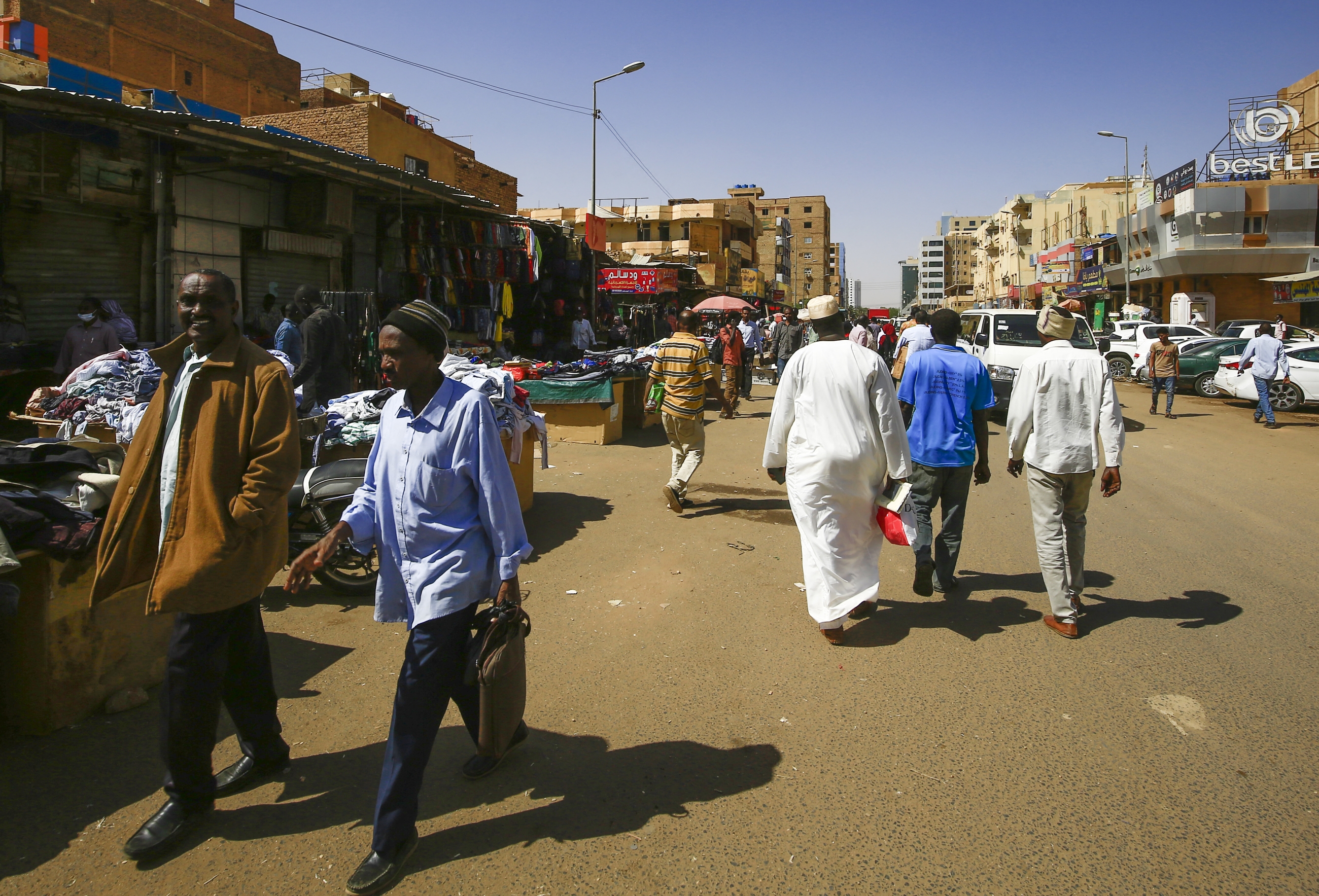
The discovery of scores of unidentified bodies in a Khartoum morgue has raised questions about the extent of the secret killings and violations that took place in the country's capital following the overthrow of longtime president Omar al-Bashir in April 2019.
The presence of more than 150 bodies found in the morgue of the Academic Hospital in southern Khartoum has angered locals, while activists, lawyers and doctors said there needed to be an investigation into whether they were the victims of security officials or pro-government gangs.
New MEE newsletter: Jerusalem Dispatch
Sign up to get the latest insights and analysis on Israel-Palestine, alongside Turkey Unpacked and other MEE newsletters
The story began last week when residents of al-Imtidad neighbourhood in southern Khartoum started noticing a strong rotting smell coming from the nearby morgue.
The discovery of the bodies has led many to believe that they might either belong to victims of the massacre of protesters at the hands of security forces in front of the army headquarters on 3 June 2019, during the Sudanese revolution, or to victims of other acts of violence against anti-government protesters.
Amar Ahmed, a 25-year-old resident of al-Imtidad, told Middle East Eye that the bad smell has created an unbearable environmental situation in the area and irritation for the hundreds of families living around the morgue.
"Living here has become impossible for us. My house is only 300 metres from the morgue, and these smells are really hard to adapt to. We want the authorities to intervene and put an end to this issue," he said.
Fatima Ali, 50, said that some families have started temporarily leaving their home to stay with relatives in other neighbourhoods. "But this is not a solution, and it is not available for some families," she said.
"We are human beings, we cannot live in this situation. We are smelling the rotting of bodies."
Thousands gather at the morgue
Resistance committees and activists have launched a sit-in around the morgue, calling on the authorities to close the establishment and investigate the reasons behind the overloading of bodies in morgues in Sudan more generally.
Thousands of young Sudanese gathered for a week in front of the morgue calling on the authorities to immediately intervene and autopsy the bodies, bury them and shut down the place down.
'This bad smell is actually the smell of corruption, mismanagement and brutality'
- Hashim Mohammed, activist
Hashim Mohammed, a member of al-Imtidad's resistance committee, vowed they would not leave until their demands were met, accusing the authorities of dealing with the issue carelessly.
"This is a scandal. The transitional government does not care about the bodies of Sudanese. This bad smell is actually the smell of corruption, mismanagement and brutality," he told MEE as he stood in front of the morgue, where the smell is unbearable.
"This is disgusting and horrible, something that has not happened before in the history of this country," activist Mustafa Galander said.
MEE visited the morgue at the hospital and witnessed the rotting bodies, the strong musty smell, and saw worms around a container placed outside the refrigerators holding the bodies.
'We do not trust anyone'
Galander, a resistance committee member, strongly suspects the bodies belong to those who died in the 2019 massacre.
"Why else would they hide them, unless there is something wrong behind the whole thing," he said.
Galander said they had formed a committee to monitor the situation closely and to ensure that authorities do not hide any probable evidence of torture, violations, or killings carried out in secret.
"We do not trust anyone, neither the Forensic Medicine Corporation nor the attorney general, so we will stay here in front of the morgue until all the bodies are autopsied in front of us," he said.
Nihal Mohammed, 35, said she believed that there was something being hidden from the public. "The suspicions are not only about the identity of the victims, but it's also about the dignity of the entire Sudanese people," she told MEE. "Any person kept here is a victim of the authorities' carelessness, regardless of how they had been killed or admitted to the morgue."
She also said that a joint committee has been formed between the attorney general, the Forensic Medicine Corporation and the resistance committee of al-Imtidad in order to follow up the autopsy of the bodies.
"Finally, and after days of debate and arguments, the autopsy process began on Tuesday. Together with the teams of the Forensic Medicine Corporation, we have so far monitored the autopsy on 11 bodies," she said, adding that they will be buried this week.
The blame game
The Forensic Medicine Corporation, the attorney general and the investigation committee of forcibly disappeared people have accused each other of being responsible for the bodies and the state they are in.
The director of the Academic Hospital's morgue, Ashwag Altahir, said in a live video on social media after the story emerged that more than 150 bodies were being kept in the morgue, overloading its capacity.
She also attributed the decomposition of the bodies to power cuts at the morgue and the hospital as whole.
She further said that the bodies have been kept in the external refrigerator because of the decision from the attorney general not to bury anybody in the morgues because of wide suspicions about different cases, including the sit-in dispersal.
"There are 154 bodies of unidentified people in this morgue and this has overloaded the morgue.
"These bodies have been here since May 2020, not 2019. The additional refrigerator we have was a donation from the United Nations during the first wave of the Covid-19 to help us keep the unidentified bodies of a number of foreigners because we had reached space capacity," she said.
"We are following the legal and necessary process for the autopsy according to the legal procedures of the police and the attorney general."
Denials and misinformation
A few days after the discovery of the bodies, the attorney general denied any responsibility for stashing them in the morgue and the delay in autopsies, which he blamed on the Forensic Medicine Corporation. He also held it responsible for failing to build a database of bodies kept in all of the capital's morgues.
"According to the investigations carried out by the attorney general, the morgues [in Khartoum] are exceeding 400 percent of their capacities," the attorney general said in a statement.
'There are many unprofessional practices here, because the dead bodies of coronavirus patients can't be admitted to the morgue'
- Forensic technician
"With the increase of the unidentified bodies we recommended the acceleration of the autopsies, DNA collection and the genetic footprint of all bodies before burying them in order to build a database and avoid overcrowding the morgues. But, unfortunately, this does not happen despite our repeated calls to the authorities," the statement said.
However, the head of the Forensic Medicine Corporation, Hisham Fagiri, has denied the attorney general's claims, stressing that the latter had ordered the burying of unidentified bodies to be halted, which has been the case since October 2020.
Addressing a gathering of protesters at the Academic Hospital, Fagiri said that there are different problems with the infrastructure of the morgue, such as power cuts and capacity, and pointed to the investigation as a reason for the situation.
But the head of the investigation committee of disappeared people, Altybe Alabasi, told MEE that the Forensic Medicine Corporation is still responsible for this overcrowding, adding that: "The committee and the attorney has been ordered to stop the burial without autopsying - not stopping the burying in general."
Cover-ups and fabrications
A group of Sudanese civil forces, Sudanese socialist doctors and others have disclosed that there are around 200 bodies being kept at the Academic Hospital's morgue, while there are around 1,250 bodies in morgues around Khartoum state.
They have demanded an investigation into the issue, including inspection of all morgues, the questioning of the Forensic Medicine Corporation, the Ministry of Health and the attorney general about the circumstances of the al-Imtidad case, and its closure, as it is located in a neighbourhood inhabited by thousands of people.
A medical source told MEE that the attitude of the both the attorney general and Forensic Medicine Corporation is very suspicious, while the government, meantime, is turning a blind eye to the case.
"We all knew that there were many previous events in Sudan where the medical reports were suspected to be fabricated to cover up the real cause of death, including the torture, long detention, shooting at protesters or other forms of violations," the source, a forensic technician, told MEE on condition of anonymity.
"There are many unprofessional practices here, because the dead bodies of coronavirus patients can't be admitted to the morgue. It is also not ethical to overcrowd bodies in a morgue to keep them for more than a year," he said.
A police source said that morgues can't legally be opened for any unidentified body without the permission of the police and attorney.
The source, who spoke on condition of anonymity because he was not authorised to talk to the press, said that keeping bodies at morgues without the police or the attorney general being notified is a violation of the law.
Middle East Eye delivers independent and unrivalled coverage and analysis of the Middle East, North Africa and beyond. To learn more about republishing this content and the associated fees, please fill out this form. More about MEE can be found here.


